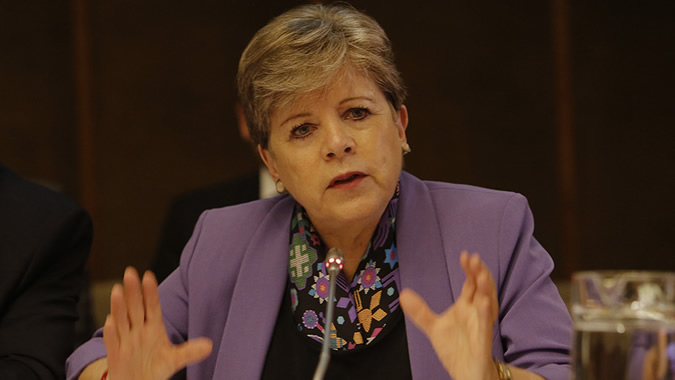Press Release
Authorities and experts from 20 Latin American and Caribbean countries, including 25 ministers and deputy ministers of energy, infrastructure, transportation and natural resources, wrapped up a week of meetings devoted to debating the governance of natural resources and infrastructure today at ECLAC’s headquarters in Santiago, Chile. The discussions were aimed at moving toward more integrated and sustainable development in the framework of the United Nations’2030 Agenda.
During the Governance Week on Natural Resources and Infrastructure, country representatives agreed on the need to foster greater dialogue with all stakeholders to arrive at a shared strategic vision that will allow for progress on issues of governance in these areas in the region.
This is fundamental for decision- and policymaking, they added, as well as to bolster regional institutions in the sustainable management of infrastructure and natural resources.
“I invite you to forge a shared vision on this issue, which creates a new balance between the State, the private sector and society, and renewed opportunities for dialogue, participation, planning and transparency.… The governance of natural resources and infrastructure requires a paradigm shift and new coalitions,” asserted Alicia Bárcena, Executive Secretary of the Economic Commission for Latin America and the Caribbean (ECLAC), to the ministers and other authorities present at the inauguration of the High-level Regional Dialogue on the Governance of Natural Resources and Infrastructure, the high point of the week, which took place on November 8-9.
On that occasion, the members of the ministerial delegations analyzed a series of recommendations for fostering a shared vision that could be considered both by governments as well as multilateral organizations and other actors (civil society, the private sector and academia) active in the region. These included: establish a government strategy that promotes a shared, long-term vision of natural resources and infrastructure governance for sustainable development; bolster the role of the State with regard to the exploitation of natural resources in order to achieve full development that is consistent with economic and environmental sustainability, respect and that guarantees social protection; and promote a new generation of integrated and sustainable public infrastructure policies that entail the provision of larger and better infrastructure and ensure that they are properly designed and carried out for the purposes of sustainable development.
They likewise insisted on the need to establish a systematic and regular Regional Dialogue as a mechanism for facilitating the development of this shared vision on the governance of natural resources and infrastructure.
The Week concluded on Friday, November 11 with a seminar on Logistics and Energy Efficiency: Key Aspects of Sustainable Development, in which government officials and international experts discussed the link between logistics chains, especially port transportation services, the efficient use of energy and its environmental impact (carbon footprint).
According to ECLAC’s data, container activity at ports alone generates some 500,000 tonnes of CO2 per year in Latin America and the Caribbean, so it is urgent that data collection and measurement be improved and that inter-sectoral collaboration be promoted to reduce the environmental impact of logistics chains.
During the seminar, the Logistics Bulletin: Energy efficiency indicators and mobility was presented. The publication was prepared jointly by ECLAC, the ports of Chile, the System of Public Enterprises (SEP) and the Chilean Ministry of Transport and Telecommunications, with support from the German Cooperation Agency GIZ. The document forms part of ECLAC’s Maritime and Logistic Profile of Latin America and the Caribbean, which provides relevant information and statistics on infrastructure provision and performance, transportation services and logistics in the countries of the region.
In addition to the High-level Regional Dialogue and the seminar on logistics and energy efficiency, the Governance Week on Natural Resources and Infrastructure included two ministerial policy discussions related to energy efficiency and governance of extractive industries and infrastructure, a meeting on public-private partnerships (PPP) as an investment mechanism in Latin America, a meeting by transportation ministers of Mesoamerica, and a meeting on the progress and challenges in terms of measuring infrastructure investment in the region, among other events.
For more details on all the meetings, visit ECLAC’s web site.



